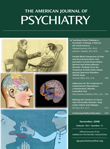Adjunctive Psychotherapy for Bipolar Disorder: State of the Evidence
Abstract
Objective: Psychotherapy has long been recommended as adjunctive to pharmacotherapy for bipolar disorder, but it is unclear which interventions are effective for which patients, over what intervals, and for what domains of outcome. This article reviews randomized trials of adjunctive psychotherapy for bipolar disorder. Method: Eighteen trials of individual and group psychoeducation, systematic care, family therapy, interpersonal therapy, and cognitive-behavioral therapy are described. Relevant outcome variables include time to recovery, recurrence, duration of episodes, symptom severity, and psychosocial functioning. Results: The effects of the treatment modalities varied according to the clinical condition of patients at the time of random assignment and the polarity of symptoms at follow-up. Family therapy, interpersonal therapy, and systematic care appeared to be most effective in preventing recurrences when initiated after an acute episode, whereas cognitive-behavioral therapy and group psychoeducation appeared to be most effective when initiated during a period of recovery. Individual psychoeducational and systematic care programs were more effective for manic than depressive symptoms, whereas family therapy and cognitive-behavioral therapy were more effective for depressive than manic symptoms. Conclusions: Adjunctive psychotherapy enhances the symptomatic and functional outcomes of bipolar disorder over 2-year periods. The various modalities differ in content, structure, and associated mediating mechanisms. Treatments that emphasize medication adherence and early recognition of mood symptoms have stronger effects on mania, whereas treatments that emphasize cognitive and interpersonal coping strategies have stronger effects on depression. The placement of psychotherapy within chronic care algorithms and its role as a preventative agent in the early stages of the disorder deserve investigation.



